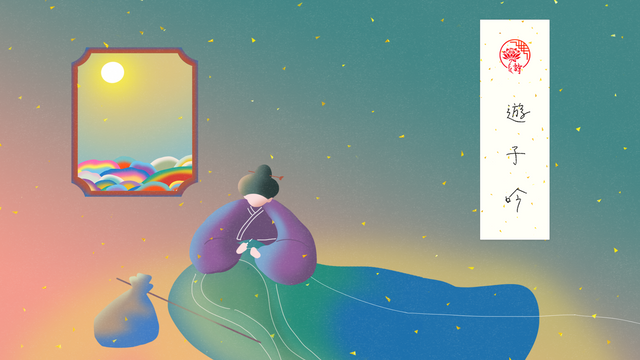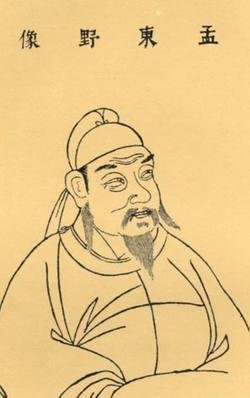Chinese poem - “The Traveller’s Chant" By Meng Jiao (Includes original song and video) | 《遊子吟》 - 孟郊 (內有原創樂曲及影片)

Within the many Tang poems, there is a handful that will always stand the test of time, the foremost one being Quiet Night Thoughts by Li Bai. If we were to choose the second one, that would probably be The Traveller’s Chant by Meng Jiao.
Meng Jiao faced adversity in early life and had a rather bumpy road. He didn’t pass the imperial exams until he was 46 years old and at 50, had only managed to get himself a rather junior ministerial position at Luoyang. By this time, he had experienced so many challenges and obstacles in life, and felt that the most valuable thing was family, specifically his mother and that he should fulfill filial piety - an important virtue of Confucianism, the duty to love, respect and look after your parent. This poem was written when he asked his mother to come and live with him at Luoyang so he could look after her.
云云唐詩當中,總會有幾個題材流傳千古,對中國人來說,李白的靜夜思就是一首人人皆懂的唐詩。如果要說第二首,你會想起哪一首?我們想起的是:《遊子吟》。
孟郊一生貧困潦倒、仕途不順,直到四十六歲才考中進士,而到了五十歲才得到了溧陽縣尉這個卑微的官位。作者經歷無數風霜、嚐盡世道炎涼,深刻地體會到親情的可貴。於是,上任後他便把老母親接到了溧陽以盡孝道。他隨後作下此詩,並自註:「迎母溧上作」。

Trivia fun fact 趣味小知識

Many great Chinese poets have nicknames such as poet immortals, poet transcendents or poet buddhist etc. Do you know what Meng Jiao’s nickname was? Because most of Meng’s poems are about his discontent with life, and the.cold harsh realities of human relationships, his nickname was poet prisoner.
相信大家都聽過「詩仙」、「詩聖」、「詩佛」之類的稱呼吧?但大家又知不知道,孟郊也有一個這樣的稱號呢?原來,因為他的詩多以人情冷暖、人民疾苦為題,所以孟郊被稱為「詩囚」。

The Meaning of the poem 作品大意

慈母手中線,遊子身上衣
Cí mǔ shǒu zhōng xiàn , yóu zǐ shēn shàng yī
臨行密密縫,意恐遲遲歸
Lín xíng mì mì féng , yì kǒng chí chí guī
誰言寸草心,報得三春暉
Shuí yán cùn cǎo xīn , bào dé sān chūn huī
The kind and loving mother is making clothes for her son who is about to leave home
She is hurrying to finish them as she doesn’t know when he will return
How can the young green grass repay the motherly love of the bright spring sun?
慈祥的母親用手中的針線,為即將遠遊的孩子縫製衣裳。
臨走時緊緊實實地縫綴,擔心孩子久久不能歸家。
;誰說小草般的孝心,能回報春天陽光般的母愛呢?

Highlights of the poem 精選詩句:

「臨行密密縫,意恐遲遲歸」
She is hurrying to finish them as she doesn’t know when he will return
A mother’s love can be expressed through actions instead of words. Here the poet is using the simple action of the mother making clothes by hand for her son. She is worried about the difficulties he has to face alone, whether he has enough clothes to keep himself warm, and when she will see him again. This wordless scene fully expresses the motherly love.
作者用質樸的語言,展現了母親對孩子最真摯的關懷與愛。我們都知道,愛不一定要用語言去表達。作者的老母親便是這樣,她沒有過多的囑咐,只是一針一線地默默編織著對孩兒的愛。「密密」二字更生動地表達出母親唯恐孩子著涼、小心翼翼的心理。孟郊的母親不僅擔心他的冷暖,還擔憂他歸家無期,在外漂泊受盡委屈。作者用樸實的語言,表達出感人的細節與心裡。

「誰言寸草心,報得三春暉」:
How can the young green grass repay the motherly love of the bright spring sun?
In Confucianism and traditional Chinese belief, a child’s filial piety is so insignificant compared to the parent’s love and sacrifices they make to bring up the child. Here, Meng uses the relationship between the tender green grass and the bright sun in the sky to express the child and parent relationship. He is grateful for everything that his mother has done for him, and feel that he can never repay her enough.
沒錯,兒女的孝心對比起父母的養育之恩,簡直是微不足道!作者用「寸草」強調孝心的小;用「三春」來強調母愛的大。「三春」是指古代稱為「孟春」的一月、「仲春」的二月,及「季春」的三月。母愛猶如三春的陽光照耀著孩子,是多麼的深厚而偉大啊!這兩句詩表達了作者對母親的感激與愧疚的複雜心情,感人至深。
As we grow up, our mother grows old, but her love for us doesn’t diminish. If you are one of the many fortunate to still have your mother with you, pick up the phone to call her or better still, drop by to see her. She more than deserves that!
人皆有母,在我們成長的同時,我們的母親同時一天天的老去,然而她對我們的愛卻永無減退。各位,在母親尚在的時候,好好的盡我們的孝心吧!

Posted from my blog with SteemPress : http://ccp-hk.vornix.blog/2018/08/09/chinese-poem/
一如既往地好听!
Thanks😎😎
互贊一下唄!
Hello @ccp-hk, thank you for sharing this creative work! We just stopped by to say that you've been upvoted by the @creativecrypto magazine. The Creative Crypto is all about art on the blockchain and learning from creatives like you. Looking forward to crossing paths again soon. Steem on!